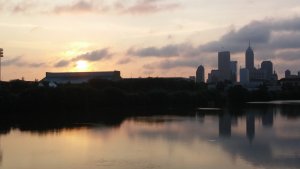
 OGETHER WITH Andy Motyka, I have been enjoying some wonderful first days at the CMAA Sacred Music Colloquium in Indianapolis. This is my third Colloquium, and all the things I love about the experience are here in force: an extraordinary faculty, magnificent liturgies, good fellowship, etc. Here are a few random thoughts about highlights thus far.
OGETHER WITH Andy Motyka, I have been enjoying some wonderful first days at the CMAA Sacred Music Colloquium in Indianapolis. This is my third Colloquium, and all the things I love about the experience are here in force: an extraordinary faculty, magnificent liturgies, good fellowship, etc. Here are a few random thoughts about highlights thus far.

We were treated to a marvelous choral evensong at Christ Church Cathedral (Anglican) on our first evening. The tone and unity of the choristers were of the highest quality and very much appreciated by those who attended the service.
I am singing in the men’s chant schola under the directions of Scott Turkington, who is returning to the Colloquium for the first time in a few years. It’s fascinating to learn from a man who is one of the true experts in the field of Gregorian chant.
Also, the number of priests in attendance is noteworthy & encouraging. There are approximately 15 priests here, which is a much larger group than usual.
When I saw on the preliminary schedule that Dr. Denis McNamara would be delivering a plenary address this year, I was very excited. In addition to all his work as an architect, Dr. McNamara has also done quite a bit of writing on the topic of sacred architecture, which is where I have chiefly encountered him. What most excited me is the fact that I don’t remember such an inter-disciplinary lecture at the other Colloquia I have attended. So, while my expectations were high, they were still far exceeded. McNamara’s presentation was engaging, fast-paced, humble, rich in theology, and filled with hope. When all is said and done, I think this may be my personal highlight for Colloquium 2014. Too soon too call? Maybe, maybe not.
 One of the other highlights has been the morning solfege warm-ups with Jeffrey Morse. I regret that I was not trained in solfege at an early age, but I can notice how, in just a few days time, Jeffrey’s presentation of the Ward Method has significantly improved my solfege facility.
One of the other highlights has been the morning solfege warm-ups with Jeffrey Morse. I regret that I was not trained in solfege at an early age, but I can notice how, in just a few days time, Jeffrey’s presentation of the Ward Method has significantly improved my solfege facility.
Finally (for now), I had the chance on Wednesday afternoon to attend a breakout session with Adam Bartlett, who presented on “Chant in English & Spanish.” After some discussion of the challenges with composing vernacular chant, Adam traced a bit of the history of the various resources that have become available in recent years for singing the propers. The group received many insights into the Lumen Christi project, which is one of the greatest recent contributions to the field. (For an good, albeit informal, review of Barlett’s latest Lumen Christi Simple Gradual, click HERE.)

Many exciting things still lie ahead this week. I’m grateful to be in this terrific city, surrounded by so many people who want to sing with the heart of the Church!

